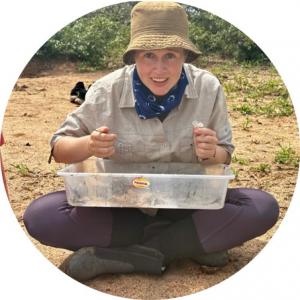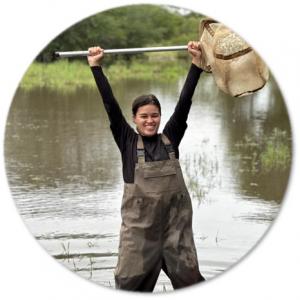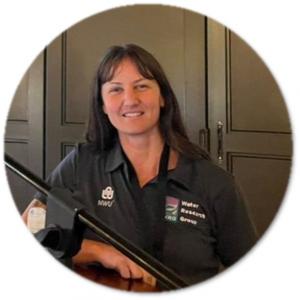|
Current research focus: Trypanosomes, blood parasites, Environment, marine and freshwater fish, life-cycle stages, diversity. Overview: Chandra is starting her Ph.D. in 2025. She obtained her Master’s degree in 2024 with distinction at the NWU Potchefstroom Campus. Chandra also obtained her undergraduate B.Sc. degree in Environmental Sciences in 2021 with majors in Zoology and Microbiology. In 2022 she became part of the WRG and finished her Honours degree in Aquatic Ecosystem Health. Her M.Sc. project focused on the biodiversity, systematics and life cycle stages of trypanosomes (blood parasites) in marine and freshwater fish. She is working under the supervision of Prof. Nico Smit. Experience: Biodiversity and systematics of marine fish Trypanosomes of South Africa. |
Chandra le Roux
Email address: 31978045@mynwu.ac.za Affiliation: SAIAB |
Linda van der Spuy
Email address: 27014452@mynwu.ac.za |
Current research focus: Environmental parasitology, marine fish parasitology, taxonomy, biodiversity, genetics and morphology, ecotoxicology. Overview: Linda Van Der Spuy is a PhD candidate in Environmental Sciences working in the Water Research Group of the North-West University. She is extremely passionate about marine life. She is embarking on a new research study focussing on the health assessment of marine environments, using parasites of the evil-eye blaasop, Amblyrhynchotes honckenii (Bloch), as bioindicators. She is optimistic that this research will aid in the conservation of marine parasite diversity and the health of our marine fishes. Her previous research involved taxonomic research of cestodes (tapeworms) infecting elasmobranchs (sharks and batoids) off the coast of South Africa. Experience: Four new species of Acanthobothrium van Beneden, 1849 (Cestoda: Onchoproteocephalidea) from the spotted skate, Raja straeleni Poll, off the Western Cape, South Africa, as well as morphological and molecular characterisation of Onchoproteocephalidean cestodes of South African elasmobranchs. |
|
Current research focus: Freshwater ecology, stable isotope analysis, aquatic macroinvertebrates, river landscape-level nutrient processing, killifish. Overview: Lomarie C. Janse van Rensburg is an emerging scientist in the field of aquatic invertebrate ecology. She is hard-working and driven in her academic career, and always finishes her projects in the given time frame. In her Honours year, she was exposed to aquatic ecology and the tools that may be used to unravel the inner workings thereof. Experience: For her master’s degree she completed her thesis on the nutrient cycling processes of the Upper-Zambezi Basin. Using a large tributary of this Basin, the Kabompo River, she concluded through stable isotope analyses and food web considerations that some river discontinuum models best explain the river nutrient dynamics of the Upper-Zambezi sub-catchment. It is her intent to develop her skills further through exposure to leading experts in the field of aquatic ecology, stable light isotopes, and genetics. |
Lomarie Janse van Rensburg
Email address: lomariejvr101@gmail.com |
Nichole Donough
Email address: nicholedon@gmail.com |
Current research focus: Killifish, bioassays, ecotoxicology, environmental parasitology. Overview: Nichole's M.Sc. under the supervision of Prof. Victor Wepener and Dr. Tarryn Lee Botha, focussed on nanomaterials contamination on freshwater shrimp. Her passion for environmental science was ignited in the final year of her undergraduate degree and she has pursued it ever since. Her Ph.D. project focuses on ecotoxicological responses of Nothobranchius furzeri to chemical and biological stressors. She loves to learn new things and has even made an appearance on “Cool Catz” in her younger days. Experience: Sublethal effects of nanodiamonds and copper oxide on the freshwater shrimp, Caridina africana. |
|
Current research focus:Assessment of different methods to determine hydraulic niche requirements of riparian plant communities: a comparison across catchments. Overview: Stacey Gerber began her career as a nature and trails guide within the Greater Kruger National Park. Responses by biota from unseen stresses that sourced from rivers sparked a passion to become apart of the solution. With the guidance of inspirational mentors inflamed with the same passion, she set her along the road to complete her Masters of Science degree with the aim to the identification of the links between riparian vegetation and their hydraulic requirements in the Lower Olifants River within the Kruger National Park. She plans to continue her research at a PhD level to expand her work to the entire Limpopo and Incomati Catchment Basins with the ultimate goal to determine the environmental flow requirements of riparian vegetation within these systems. She hopes that her research will assist managers to make the right decisions when provisioning the water requirements for inland aquatic ecosystems to maintain the integrity and functionality of processes that both humans and animals rely upon for ours and their survival. Experience: The effect of flow variability on riparian vegetation in the lower Olifants River. |
Stacey Gerber
Email address: staceygerber@yahoo.com.au |
Last updated: February 2025
Comments on the content and accessibility: Anja Erasmus







